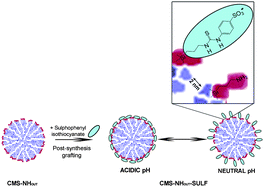Controlling the delivery kinetics from colloidal mesoporous silicananoparticles with pH-sensitive gates
19-Apr-2010
J. Mater. Chem., 2010, 20, 4305-4311 published on 19.04.2010
J. Mater. Chem.
An effective pH-dependent nanoscale delivery system was synthesized, based on ionic interactions between amino functionalities and sulfonategroups that are located at the pore entrance of colloidal mesoporous silica (CMS) nanoparticles. By means of a delayed co-condensation approach, we were able to synthesize CMS nanoparticles with aminopropyl functional groups located exclusively at the outer particle surface. Sulfophenyl isothiocyanate (SULF) molecules were covalently attached to part of the amino moieties. At acidic pH, the unreacted protonated amino groups interact with the sulfonate groups, leading to a gating system. The small mesopores (3.7 nm) were effectively sealed under acidic condition (pH 2 and 4), thus preventing the release of the model drugibuprofen from the inner volume of the modified CMS particles. In the absence of the gating system, unfunctionalized CMS nanoparticles released the drug within a short period. When the pore size was increased by about 1 nm, the sealing effect was no longer observed, implying a delicate matching of the gate size and the pore diameter. At neutral pH, the unprotonated amino groups engage in weaker interactions with the SULF moieties, thus gradually opening the mesopores. A sustained release behavior was observed for the small pore gated sample. In contrast, fast release of the drug was shown from the unfunctionalized mesopores and the large-pore gated sample. These findings show that the drug release rate can be finely controlled by changing the pH value of the release medium, as long as the size of the gating system is matched to the mesopore diameter.



